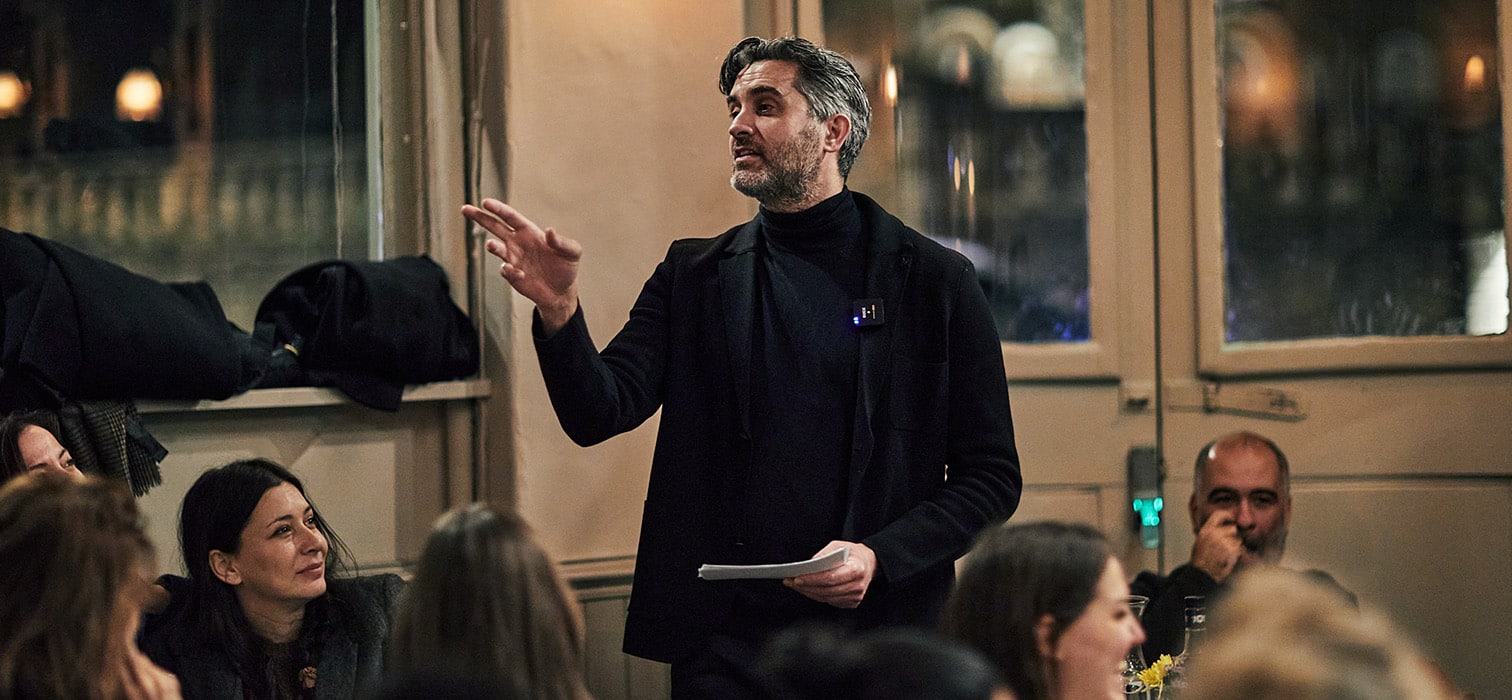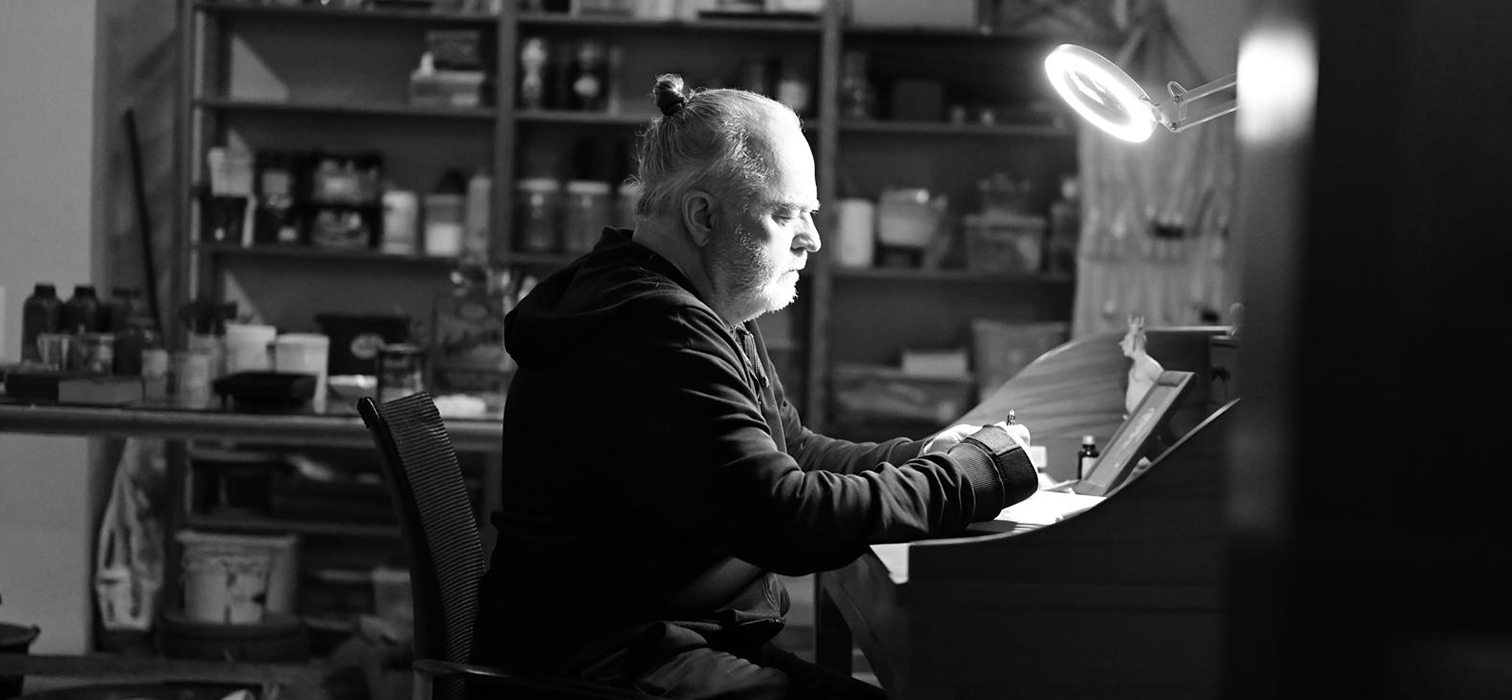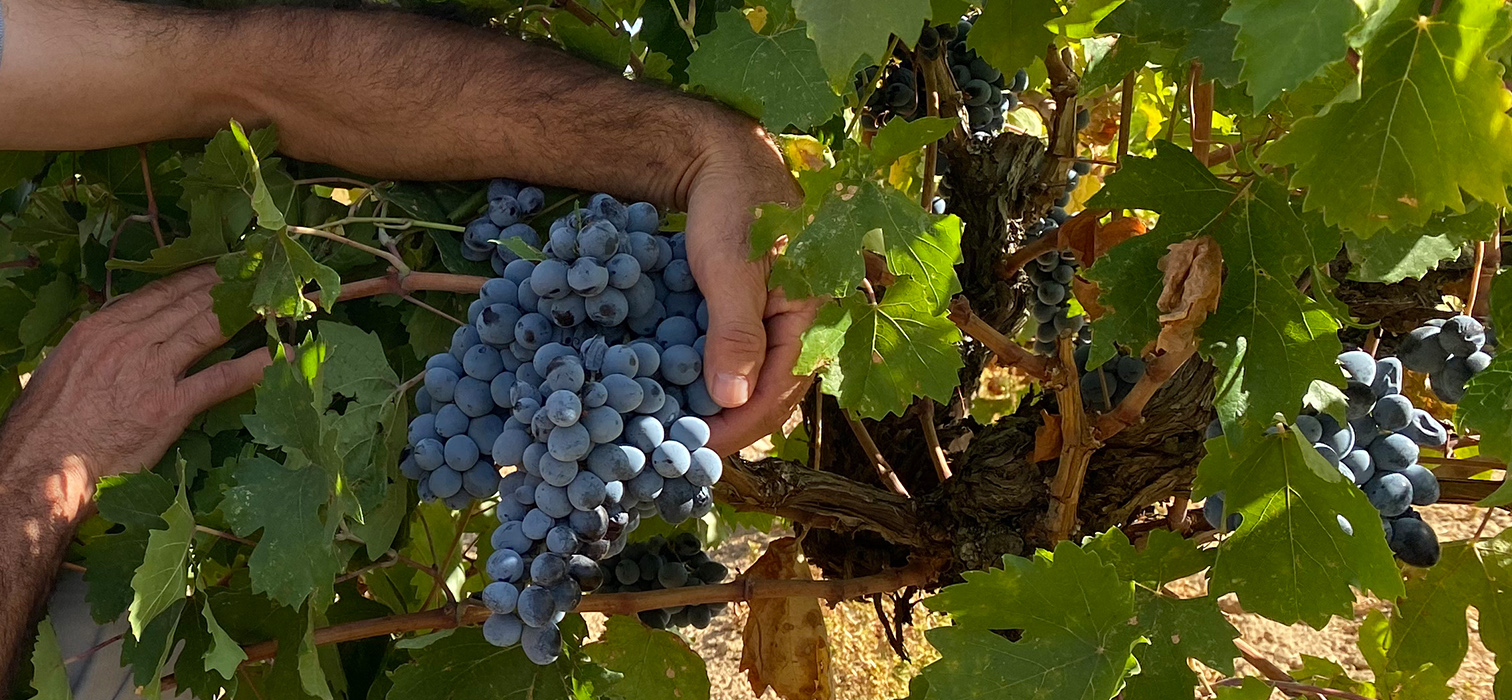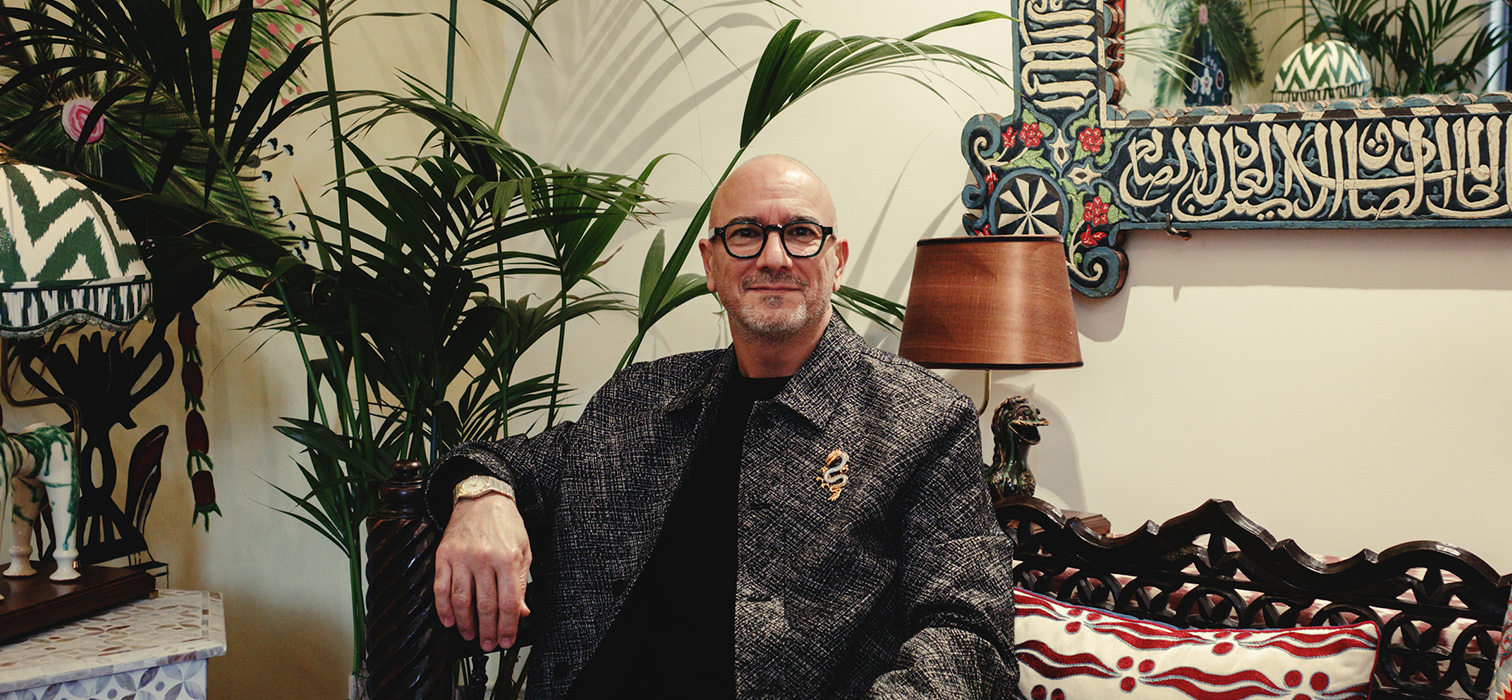An Exclusive Interview with Memet Ali Alabora

Famous chefs, musicians, writers, everyone met in Bol Kepçe District recently. Behind the planet’s first online food and drink festival is an innovative idea whose international reflections we will see more frequently in the next few years, a huge team, and Memet Ali Alabora.
It was the pandemic period. Time was passing by as everyone clung to the last remnants of their minds and engaged in conversation with the other selves within them. You know what I’m talking about. While this collective loneliness was destroying us all, I came across an IG post; “Time of the Universe”. A tavern night to which everyone from all over the world is invited. At a time when people couldn’t even find the strength to care about what they ate, drank or wore, I spent hours preparing appetizers, getting dressed, tidying up my face and attending. What follows is an embrace that lasts 4.5 hours. I think we remembered that we were human beings with the pleasure of seeing different faces connecting from Berlin, Kenya and Izmir. “Does the tavern have an online service, dear?” I entered the night by saying this and left chasing the next event.
On the face of it, it is an online tavern, and in the subtext, it is the Meyhane Elsewhere project, which is the solution to loneliness at that time, and belongs to Memet Ali Alabora and Tan Morgül. The parent project is Istanbul Elsewhere and gather-in, which is the umbrella of these online events. In addition to his partners and companions Akın Olgun and Mustafa Aldemir, you also have a monster team of 10 people. Memet Ali Alabora, one of the founders of gather-in, which recently organized the world’s first online food and drink festival, asked: “What will be the end of this online world?” We present with pleasure our interview titled.

How did this online neighborhood work start?
In 2019, we implemented the Istanbul Elsewhere project and started organizing Pop-up Taverns in London. When there was a “lockdown” in March 2020, Tan asked, “Can we open an online tavern?” So, I created a Zihni Sinir project. When I arranged 6 Google Meets on a screen and shared my screen with those who attended each session, our online tavern with 6 tables, Meyhane Elsewhere, was born.
We continued two days a week for six months, then one day a week for the next six months. In the meantime, we developed gather-in as a platform. The company was founded on May 1, 2020. At that time, Istanbul Elsewhere and gather-in were going hand in hand. Then, in July 2022, we received an investment and turned Gather-in into a platform where everyone can open their own place. Istanbul Elsewhere, on the other hand, is a cultural project that organizes Istanbul events in London as its main center and now in many parts of Europe and tries to discover how Istanbulism is performed outside Istanbul. The two are now completely separated from each other.

Did the dreams you had back then come true? Or did the project fly by?
Indeed, one day, while the project was still being worked on, wireframes arrived. For those who don’t know, the interfaces you see in a digital product are initially designed as colorless wireframes. When they came, we stopped and said, “Wait a minute, there is something else here, we will be a platform.” Of course, there were a few times during the process when we stopped and said, “We should do it this way, not like that.” But the vision we first thought of is still valid. What we are really trying to achieve is to become a global neighborhood. Imagine, you are sitting at home in the evening and wondering whether you should watch Netflix, read a book, or go out. But then you say, “Wait, let me hang out at the gather-in, our kids are there or I can meet new people.” The goal is to create hundreds, thousands of spaces here. In some, the Japanese talk about manga, and in some, the Americans talk about Superbowl…
You mentioned the concept of “third place” in an interview. The first area is our home; the second space is work and the third space is any place where we can socialize. Gatherin addresses exactly this. Don’t you think the boundaries between these three areas are starting to blur?
This is the classification of American urban sociologist Roy Oldenburg. The place he conceptualizes as “third place” is everywhere we socialize outside of home and work. We also say that we are the digital “third place”. With remote working, home and work have become intertwined. Now the mobile phone has become like an office. When we are at home and when we are at work, it is a bit complicated. We can also take work where we socialize. If the man had lived, he would probably have to think again about these three separate concepts.
Are you one of those who can protect the boundaries between the three areas?
I am currently living all three of them here, at home, in front of a screen. It all came together. I’m at work right now, but I’ll socialize at the gather-in in the evening.
And they will all be on the same chair…
Exactly. I wrote an article about this on Medium. It was a little experiment that said, “Actually, we are already living in the Metaverse” when the Metaverse events were breaking out.

What will be the end of this online world?
With Web2, we have already become constantly “connected”. Our interaction during the day is so much more than before. We are constantly connected from Whatsapp, from the map, etc. We even see the money deposited into our bank account instantly. Everything happens instantly. It will progress further with the glasses released by Apple. It will become more intertwined with physical and digital. I don’t know what’s going to happen.
Does it scare you?
Technology never scares me. I use technology immediately. Anyway, we cannot stand in front of technology. We determine the relationship we establish with him, but we can also determine it to a certain extent. We’ll see. It is very important that we do not lose the human connection. But this will change our lives forever. After all, it is the biggest transformation we have experienced since the industrial revolution. For example, a piece of information I just learned: We are not actually creatures that sleep for 8 hours. We used to sleep for two 4 hours a day. Until the industrial revolution. Can you imagine, we even changed our sleeping habits. This will change it too. It’s not good or bad, but it will change. It even changes.
On the other hand, establishing a neighborhood, even online, seems to stem from the same need. Being side by side, belonging, being together and united…
Yes, does being online tear us apart or unite us? In fact, if we were able to get through the pandemic a little smarter, it was because of these things. Otherwise he might have become more of a nutjob. We have such users that they meet their friends here. Even though they live in very distant places, this becomes a place where they can establish great relationships. The sociability of social media has contributed a lot to us. It has a side that threatens to make people lonely, but it also has a side that is a cure for loneliness. That’s why we made gather-in.
Let’s go back to the neighborhood. Can you tell me a little bit about what’s going on in this neighborhood?
There are also places opened here just for socializing, book clubs… There are places where food is discussed and workshops are held. Places where cryptocurrency is talked about, new generation real estate agents… Anyone who wants can establish their own club, open their own restaurant, venue or grocery store. New categories continue to open every day.
Isn’t the rent paid?
Not paid. Opening a venue is completely free. If you pay to enter your venue, 80 percent is yours and the gather-in gets 20 percent.
And recently, the world’s first online food and drink festival took place, right?
Yes, “Bol Kepçe District”. Some of the venues here will continue later.
As the owner of the place, do you agree with all of them?
Of course, I couldn’t go to all the places, but I try to visit all the places as much as I can.
I would like to move on to Istanbul Elsewhere, which still continues its activities in Gatherin. Now, both online taverns continue and pop-up tavern nights are organized in the UK and Europe.
Yes. Online taverns are held twice a month. Pop-ups take place in various parts of Europe, we did one in Berlin. The last one was in Lisbon, next is Amsterdam.
I joined an online tavern called Vakt-i Kainat during the pandemic period. There were also participants from Berlin, and also from Kenya… It was like a medicine since it was a period when we couldn’t socialize. What kind of need does it meet now?
Same thing actually. You probably have friends around the world, but I’m sure you haven’t seen them for a long time. You mostly correspond via Whatsapp or occasionally video chat. When you come to the tavern, you spend three or four hours longing. When you say “I can do that on Zoom too”, I say this. When you do this at a gather-in, it’s like going out for a night with your friend. Other people come to your table, and an announcement is made from time to time… Let me even say that online taverns are even more crowded these days than they were during the pandemic.
So, is there any fighting noise?
It doesn’t happen very often, but there has never been a fight in the pubs I’ve been to. The tavern has its manners and its regulars are known. There was very little fighting.
Are there any treats?
We will soon develop iridescent treats from the side table as a function. 🙂

I would like to ask about the etiquette of the tavern. This is both a cliché and some things that are engraved in all of our minds. What kind of etiquette does the online tavern have?
The owner and operator of the tavern is the barba. Barba is also the doctor of the tavern. It is the person who decides who to give alcohol to or not to. In fact, it is the barba that protects and ensures that the racon of that place continues. When we opened this place, we called ourselves barba. You know, Tan writes about tavern culture. It was only the second or third tavern, and we were going from table to table with Tan. At the sixth table, someone sat slouching. When I came back from his table to the first table, Tan said, “Tell him not to sit slouching.” “Brother,” I said, “How can I tell you?” Then this turned into a story between us, and I started telling it. “Look, Tan is such a grumpy person, scolding me.” Of course, we exaggerated.
Zülfü Livaneli came to a pub during the pandemic period. And he said, “Oh, this is difficult, Barba.” Tan’s name changed from “Zor Barba” to a bully. Jokingly, there’s actually a little story there. A racon also explains. Even if it is online, the tavern has its own manners. Not interrupting someone else, not sitting slouched… The things we see in the pub are carried online and form a ritual there, too.
For example, it is said that one should not talk about this at the raki table. What is not talked about here?
Well, everything is talked about. Unlike normal taverns, when discussing national issues, several national issues are discussed at once. While Trump is being discussed at one table, Boris Johnson is being discussed at another table. I guess this is something unique to online taverns.
Are the issues being resolved?
Matters are never settled.
I initially approached this online tavern issue from a pessimistic perspective. Is it possible? And then I saw it happen with my own eyes. When you compare online and offline taverns, what does each one lack?
I don’t think, it’s comparable. They both have their own sweet sides. Very strange things are happening in the online tavern. While there was someone from Miami sitting at the table, suddenly a Polish person sat down. The other one is completely physical, and you share food, what else can you ask for? In this sense, they cannot be compared, but the conversation becomes just as dark as the physical.
What’s the most interesting story so far?
For example, a team of people, some of whom are in London, some in Istanbul, and some in other parts of Turkey, met here and became regulars, celebrating their birthday in Çeşme last summer. I also remember; Two theater actors, one living in Vienna and the other living in Cyprus, met here, then they always hung out at the same table and now they are producing plays in Cyprus.

How does acting go with all this work? We last watched you in the role of Sultan Süleyman in The Serpent Queen. How was the sultanate?
I do acting from time to time, whenever I have the opportunity. Serpent Queen was shot in Marseille in the middle of the pandemic. We spent five weeks there, but I was already in quarantine for 10 days when I first went and 10 days before returning. Meanwhile, I sat in the hotel room. It was a strange process.
Are there any other acting projects?
There is an agency I am affiliated with here. I go to Audition very rarely. We are making self-tape now. That too changed with the pandemic. We shoot ourselves at home, send it, then wait. I haven’t been to a set in a while.
Do you miss?
I don’t miss it at all.




